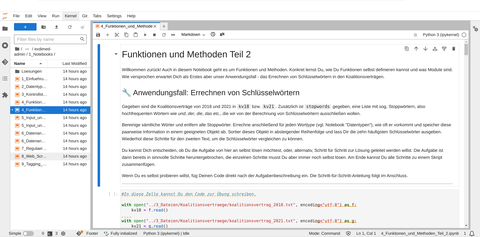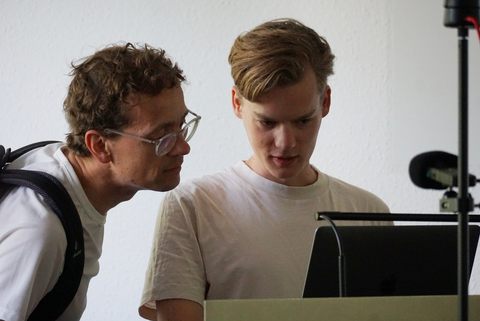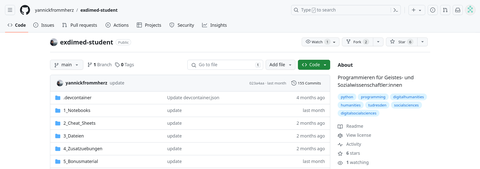ExDiMed
In our project ExDiMed (Experimentierraum Digitale Medienkompetenz) we are experimenting with blended learning formats to teach students of humanities and social sciences digital competencies in dealing with media and data. We have developed teaching and learning materials to specifically teach programming skills as a central digital competence. The content has been successfully tested in flipped classroom seminars - with a great response: many students have become enthusiastic about programming and are now able to work on (quantitative) application problems and research questions in a flexible and needs-oriented manner. Especially in the age of powerful AI, it is clear that AI cannot be used for programming without a basic understanding. Our openly licensed OER materials therefore make an important contribution to the integration of technical skills in humanities and social science courses.
Our focus lies on a target-specific programming course in Python, which imparts both – fundamental knowledge and application-specific know-how. In interactive Jupyter Lab modules students are enabled to collect and explore their own data (web scraping), preprocess this data, analyze it according to specific questions, and visualize it. In addition to interdisciplinary programming skills, competencies for addressing discipline-specific use cases (e.g., from linguistics) are also taught.

Insight into a learning module on Jupyter Lab
The programming courses culminate at the end of the semester with a joint hackathon, in which students solidify their acquired competencies and collaboratively work on a specific programming problem.

Collaborative Coding
In addition to the teaching notebooks in the programming courses, we offer all our materials as Open Educational Resources for self-learning and to deepen programming skills. This includes a module for introduction to Git and GitHub, a notebook for training a custom language model, as well as for reprogramming a text generator.
Materials on GitHub: All learning materials are provided as open source via GitHub and are continuously expanded upon.

Materials on GitHub
Our long-term goal is to establish the developed formats in the Digital Humanities Master's program.
Frommherz Y & Langenhorst J: Digitale Kompetenzen für Geistes- und Sozialwissenschaftler:innen. Vorzüge eines Blended Learning-Formats für die Vermittlung von Programmierkenntnissen. DOI: https://doi.org/10.25369/ll.v2i1.37
- Prof. Dr. Simon Meier-Vieracker (Chair of Applied Linguistics, Project Leader)
- Yannick Frommherz (Project Assistant)
- Anne Josefine Matz (Student Project Assistant)

